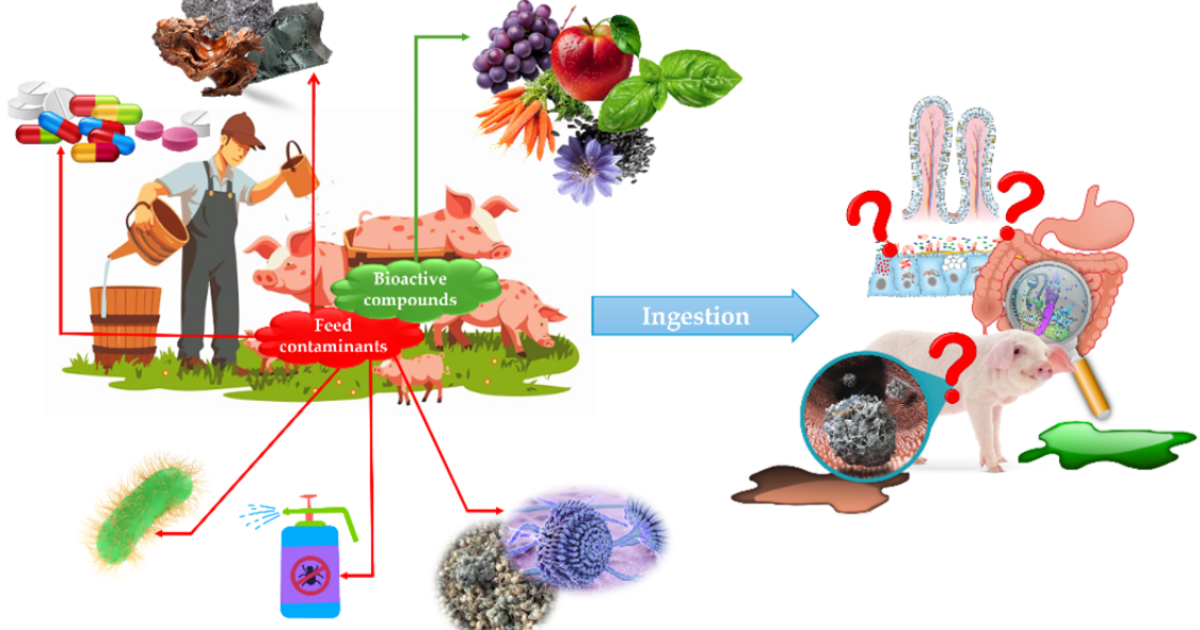- 3.6Impact Factor
- 6.3CiteScore
- 19 daysTime to First Decision
Intestinal Health and Immunomodulation in Swine
This special issue belongs to the section “Farm Animal Production“.
Special Issue Information
Dear Colleagues,
Intestinal health is a crucial topic in Farm Animal Production due to the increasing incidence and mortality caused by intestinal diseases, especially in swine. Gut health encompasses not only well-being issues but also economic losses for farmers and the swine industry at large. Due to the native sensitivity of a pig’s gut, its functionality can be disrupted by ingesting feed contaminants such as bacteria, mycotoxins, heavy metals, pesticides, or other common xenobiotics in their feed. In pigs, the most common toxic effects observed are diarrhea, vomiting, reduced appetite, or weight loss. However, despite visible symptoms, some agents can trigger the immune response, and long-term exposure to low doses of these contaminants could also negatively affect pigs’ health. Equally important is the study of the beneficial effects that certain bioactive compounds could have in maintaining the intestinal health of pigs.
This Special Issue focuses on intestinal health, studying the factors and mechanisms that can damage the intestinal epithelium and trigger the immune response. Our goal is also to find new ways to diagnose, prevent, and treat intestinal-related diseases, thus supporting the health status of pigs and the economy.
Dr. Valeria Cristina Bulgaru
Dr. Gina Pistol
Guest Editors
Manuscript Submission Information
Manuscripts should be submitted online at www.mdpi.com by registering and logging in to this website. Once you are registered, click here to go to the submission form. Manuscripts can be submitted until the deadline. All submissions that pass pre-check are peer-reviewed. Accepted papers will be published continuously in the journal (as soon as accepted) and will be listed together on the special issue website. Research articles, review articles as well as short communications are invited. For planned papers, a title and short abstract (about 250 words) can be sent to the Editorial Office for assessment.
Submitted manuscripts should not have been published previously, nor be under consideration for publication elsewhere (except conference proceedings papers). All manuscripts are thoroughly refereed through a single-blind peer-review process. A guide for authors and other relevant information for submission of manuscripts is available on the Instructions for Authors page. Agriculture is an international peer-reviewed open access semimonthly journal published by MDPI.
Please visit the Instructions for Authors page before submitting a manuscript. The Article Processing Charge (APC) for publication in this open access journal is 2600 CHF (Swiss Francs). Submitted papers should be well formatted and use good English. Authors may use MDPI's English editing service prior to publication or during author revisions.
Keywords
- swine
- intestinal health
- immunomodulation

Benefits of Publishing in a Special Issue
- Ease of navigation: Grouping papers by topic helps scholars navigate broad scope journals more efficiently.
- Greater discoverability: Special Issues support the reach and impact of scientific research. Articles in Special Issues are more discoverable and cited more frequently.
- Expansion of research network: Special Issues facilitate connections among authors, fostering scientific collaborations.
- External promotion: Articles in Special Issues are often promoted through the journal's social media, increasing their visibility.
- e-Book format: Special Issues with more than 10 articles can be published as dedicated e-books, ensuring wide and rapid dissemination.


